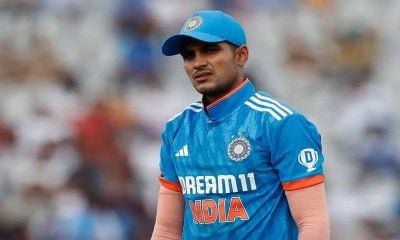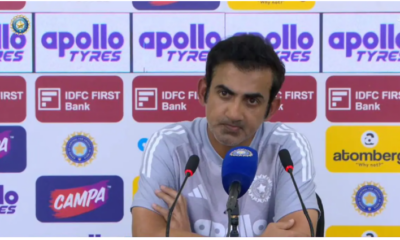It’s a piece of news that will be welcomed by many whose interest in sports lies in the money to be made, rather than the side that wins or loses: The Law Commission of India has recommended legalisation of sports betting and gambling activities and regulating them, stating that a complete ban has proved to be “counter-productive” and has only resulted in a hike of “black money generation and circulation”.
It said that since it is impossible to stop illegal gambling, the only viable option left is to “regulate” gambling in sports and it be allowed as regulated activity taxable under the direct and indirect tax regimes and used as a source for attracting foreign direct investment (FDI).
The commission recommended “cashless” gambling in sports and taxing the earnings as a means to increase revenue and deal a blow to unlawful gambling. The money generated can be used for public welfare activities, it said.
The commission’s report, “Legal Framework: Gambling and Sports Betting including Cricket in India”, recommends a number of changes in the law for regulating betting and generating tax revenues from it.
The Law Commission report was prepared by a panel headed by Chairman Justice BS Chauhan after the Supreme Court ordered it to study the possibility while hearing a case between the Board of Control for Cricket in India (BCCI) and Cricket Association of Bihar & Ors.
The commission had taken opinion from students, experts and public in general before coming to the conclusion that regulation was needed more than prohibition. It has also proposed that the income earned from these activities should be made taxable. If the proposal goes through, it could lead to a windfall for the government.
“In the light of the fact that the existing black-market operations relating to these activities are a major source of influx of black money in the economy, regulation rather than complete prohibition the logical step to be taken,” reads the report.
While pondering over the question, the commission looked at examples from Mahabharata as well.
“The argument that had gambling been regulated in the Mahabharata period, Yudhishtir could not have put his brothers and wife as stakes, perhaps Mahabharata could not have been there, is full of substance,” noted the commission.
At present, betting is legal only on horse racing, and it is taxed at 28 per cent under GST. The commission recommended that like the exemption for horse-racing as a game of skill, “other skill-centric games may also be exempted from the blanket prohibition on gambling”.
The commission has also recommended amending the laws regulating forex and India’s FDI policy to allow investments in the casino and online gaming industry.
It also proposed strong regulations and laid down several checks and balances to avoid misuse if betting is indeed legalised.
It has stated in its report that such activities should be offered only by operators from India possessing valid licences granted by a game licensing authority.
The commission recommended a classification of ‘proper gambling’ and ‘small gambling.’ ‘Proper gambling’ would be for the rich who play for high stakes, while ‘small gambling’ would be for the low income groups, it said.
Restrictions on amount should be prescribed while using electronic money facilities like credit cards, debit cards, and net banking. Gambling websites should not solicit pornography, it said.
For those who would participate in gambling and betting, there should be a cap on the number of transactions that they can indulge in monthly/yearly etc.
It has also proposed that all betting and gambling activities should be linked to the operator’s and participant or player’s Aadhaar Card/PAN Card, to ensure “enhanced transparency and state supervision”.
Also, transactions need to be cashless, “with penal provisions for cash transactions”, it said.
Those who receive “subsidies or do not pay taxes” have been excluded from participating in such betting and gambling.
Making betting and gambling legal has been debated for long. Estimates about the size of the gambling market in India vary, with a 2010 KPMG report suggesting that it could be $60 billion, but more recent studies peg the value to be much higher, said a News18 report.
According to Doha-based International Centre for Sport Security, the illegal betting market in India is worth $150 billion, or roughly Rs 9.6 lakh crore, the News18 report said. Most of it is via local bookmakers and unregulated offshore websites.
The government could earn tens of thousands of crores as tax revenue by legalising sports betting. Additionally, if online gambling and casinos are also permitted, the estimated tax revenue would be much higher.
In addition to revenue generation, a legal and regulated gambling sector will also help in creating large-scale employment opportunities.
Parliament may also enact a model law for regulating gambling that may be adopted by the states or in the alternative, Parliament may legislate in exercise of its powers under Articles 249 or 252 of the Constitution. In case legislation is made under Article 252, states other than the consenting states will be free to adopt the same, it states.
The commission said it feels that allowing FDI in the industry would bring substantial amounts of investment to those states that decide to permit casinos, propelling the growth of the tourism and hospitality industries, while also enabling such states to generate higher revenue and employment opportunities.
Justice BS Chauhan stated that with time law changes and thus the need is for regulation rather than blanket prohibition. Quoting Justice DP Madon, the commission stated “as the society changes, the law cannot remain immutable” and that “the law exists to serve the needs of the society which is governed by it.”
The primary law on which states have framed their gambling legislation is an archaic, British-era law called the Public Gambling Act, 1867. Ironically, while India follows a British-era prohibitionist statute, the UK legalised and regulated various forms of gambling and betting many decades ago.
The commission report referred to epic Mahabharat to justify its call for regulation of gambling.
“There is merit in the argument that, had gambling been regulated at the time of the Mahabharat, Yudhishtir could not have staked his wife and brothers in a gamble,” the report signed by Justice Chauhan and five other commission members observed.
The commission said that even as Indian society had traditionally frowned upon gambling, the argument made for ‘revenue over morality’ lacked merit. It reasoned that online gambling and betting have acquired a global presence.
“Such activities, if properly regulated would ensure transparency in the market, as also strike at the underworld’s control over the illegal and unregulated gambling industry. Additionally, revenue so generated by regulating and taxing betting and gambling may become a good source of revenue, which in turn, could be used for public welfare,” the commission report said.


 Latest world news18 hours ago
Latest world news18 hours ago
 Latest world news19 hours ago
Latest world news19 hours ago
 Cricket news19 hours ago
Cricket news19 hours ago
 India News15 hours ago
India News15 hours ago
 India News10 hours ago
India News10 hours ago













